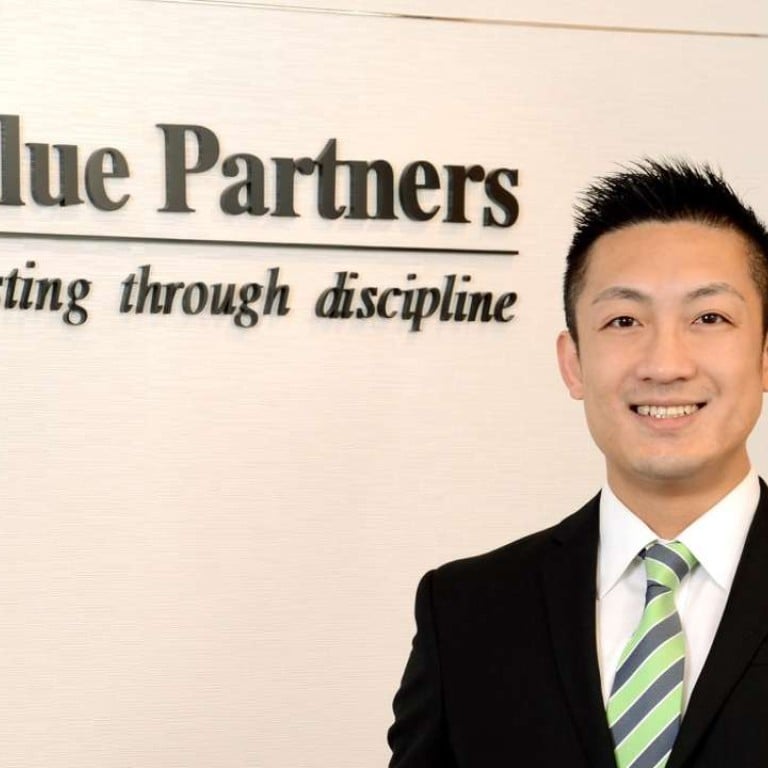
Timothy Tse resigns as CEO of Hong Kong fund house Value Partners
Founder Cheah Cheng Hye will assume charge of the fund he founded in 1993, until a successor is found
Timothy Tse, chief executive of Value Partners, is stepping down after five years in the top job and a decade at the Hong Kong fund house to pursue other business opportunities.
Value Partners’ founder and chairman Cheah Cheng Hye will serve as interim CEO until a successor is found.
Tse said his departure was amicable. “The company has experienced different cycles throughout my 10 years here. It is time for me to move on and look for other business opportunities,” he told the Post.
“Value Partners has seen high growth these past five years. It has been a a tremendously successful platform. I am very grateful for all the opportunities that Mr Cheah has given me. I have learned a from him. It was more than business,” Tse said.
Under Tse, Value Partners transformed from a Greater China equities fund house to an Asia-Pacific investment platform. During his tenure the fund expanded its franchise in mainland China, Taiwan and Singapore, while alsotaking up new mandates fromEuropean and US institutional investors. The company’s assets under management have grown from US$7.2 billion in 2011 to US$14 billion now.
Tse’s departure has come after a tough year in Asian markets, with Value Partners’ first half 2016 net profits plummeting 99 per cent year on year to HK$3 million. Assets under management, the sole source of fee incomes for fund managers, were down as clients pulled back from making new investments and redeemed US$4.7 billion in the first nine months. Net outflows from Value Partners amounted to US$1.8 billion in the first nine months of this year.
Even though assets and management fee incomes were down, JPMorgan analyst Jemmy Huang said Value Partners had done little to rein in costs, which contributed to volatile business and “very poor” financial results. “Total expenses were down only 6 per cent as fixed expenses increased 12 per cent for overseas expansions. Share-based compensation expenses will stay high in 2016 and 2017,” she said.
This is a story of robust growth and client confidence achieved by a home-grown firm that Hong Kong should be proud of
In the aftermath of the last financial crisis in 2009, Value Partners saw the breakup of its investment team, with senior fund managers leaving to form their own fund group Zeal Asset Management.
However, Cheah said Value Partners has a strong and proven platform and is well-positioned for an emerging recovery in industry growth. “The fund management industry generally, including firms like Value Partners, is currently experiencing difficult operating conditions, but I believe such slowdowns do happen from time to time and are temporary,” he said.
Value Partners was established in 1993 with US$5.6 million under management, reaching US$5.7 billion when it was listed in 2007. “Clearly, this is a story of robust growth and client confidence achieved by a home-grown firm that Hong Kong should be proud of,” Cheah said.
Despite his departure, Tse still has a number of influential roles in the market. He advises the Securities & Futures Commission as a member of its product advisory committee; he serves as a vice chairman of the Hong Kong Investment Funds Association; and is also an executive member of the Alternative Investment Management Association in Hong Kong, the go-to lobby group for hedge funds globally. In China, Tse also holds a rare committee seat at the Asset Management Association of China, the self-regulatory trade group for mainland funds, as an international member.
Tse was vague about his future plans, but offered the Post a few hints. “The mainland market still offers a lot of opportunities in terms of product solution demands for the wealth management or asset management market. I am highly confident of the market’s future,” he said, adding that his view was backed by the size of China’s investable assets and a belief that mainland capital controls can be only be relaxed but not tightened further.
This was the case even though Value Partners last year exited its mainland fund joint venture on market expectations it would receive the foreign mutual fund industry’s first private fund manager licence – which has yet to happen.
Value Partners still maintains its Wholly Foreign Owned Enterprise (WFOE) presence on the mainland, which houses the firm’s research coverage for its Hong Kong investment team, and allowing it to direct business to the Hong Kong headquarters via a Qualified Domestic Limited Partners license.

